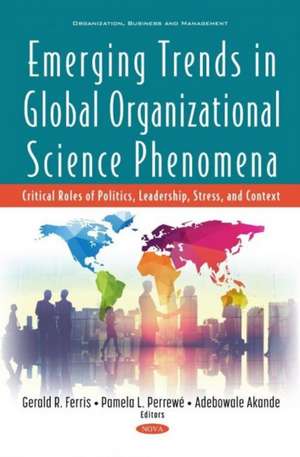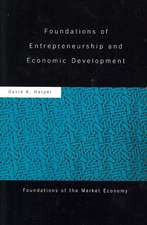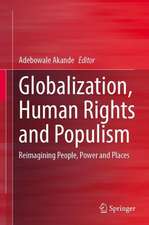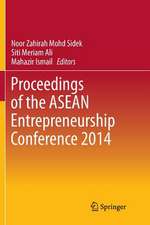Organizational Science: A Global Perspective
Editat de Adebowale Akande, Pamela L Perrewe, Gerald R Ferrisen Limba Engleză Hardback – 22 noi 2021
Preț: 1633.11 lei
Preț vechi: 2091.86 lei
-22% Nou
Puncte Express: 2450
Preț estimativ în valută:
312.53€ • 339.36$ • 262.53£
312.53€ • 339.36$ • 262.53£
Carte disponibilă
Livrare economică 01-15 aprilie
Preluare comenzi: 021 569.72.76
Specificații
ISBN-13: 9781536194937
ISBN-10: 153619493X
Pagini: 540
Dimensiuni: 178 x 254 mm
Greutate: 1.18 kg
Editura: Nova Science Publishers Inc
Colecția Nova Science Publishers Inc
ISBN-10: 153619493X
Pagini: 540
Dimensiuni: 178 x 254 mm
Greutate: 1.18 kg
Editura: Nova Science Publishers Inc
Colecția Nova Science Publishers Inc
Cuprins
Dedication and Acknowledgments; Editorial Foreword: Overview, Perspectives, and Themes for Global Organizational Science Research; Global Organizational Science: A New Reality for World-Class Organizations Twilight of Dawn or of Evening?; Research Methods in the Organizational Sciences; The Interplay of Philosophy of Science, Statistics, and Storytelling; Personal Reflections on Cross-Cultural Research; Xenophobia in the United States: Structural Drivers; Thirty Years and Growing: Review and Identification of Theory/Research Challenges in Perceptions of Organizational Politics; Monetary Wisdom: From the Holy Bible to a Global Theory of Organization Science; The Pandemic Political and Social Bill; Crafting Inspirational, Memorable, and Practical Theories: The Lessons of The Last Supper; Critical Analysis of New Themes and Trends of SHRM in the Perspective of Business Ethics and Philosophy of Management; Psychological Need Strength and Work Motivation as Sequential Mediators in the Perceived Organizational Politics Job Performance Relationship; The Jerk Whisperer: The Interactive Effects of Abusive Supervision, Self-Control, and Supervisor Performance on Subordinate Supervisor Social Exchange Quality; Attenuating the Negative Effects of Abusive Supervision: Resilience in the Face of Adversity and Punishment to Dissuade Deviance; Leadership Styles Employee Upward Influence Tactics Relationships: Testing the Moderating Effects of Political Skill and Organizational Politics Perceptions; Moderating Effects of Leader Narcissism on the Relationships Between Leader Political Skill and Follower LMX and Affective Commitment; Linking Psychological Capital to Ambidexterity: Does Leadership Perception Matter?; The Role of Family Ownership and Control Over the Organizational Political Environment: The Importance of Political Skill for Top Management Team Members; Leveraging Social Media to Enable Leadership during Crises: Linking Treat Leader Behaviors and BOAT Leader Attributes; Leadership Style Differences Between North American and Indian Immigrants: A Cross-Cultural Comparative Analysis; Motivation to Engage in Distributed Leadership: An Agenda for Future Research; Discourse, the Longue Dure, and Regional Identity: Why Regions Fragment into States but only Europe Re-Integrates, Contentiously; Creative Team Networks and Innovation Outcomes: The Effects of Context and Team Socio-Structural Factors in Creative Industries; The Role of Emotional Exhaustion, Vigor, and Negative Affectivity in the Abusive Supervision Work Outcomes Relationships; Social Class, Gender and Working Status as Determinants of Stereotype Content in Two Cultures; Remembering Together: Individual and Social Aspects of Collective Memory; The Relationship between HRM and TQM Practices among Egyptian Employees; On the Primacy of Emotion: The Order of Things From Aristotle, James, Darwin, Tomkins, to Ekman, Izard. Boyle, and Akande; From Myself to Ourselves: Self-Transcendent Emotions, Collective Gatherings and Rituals; Diagnosing the Emotional Climate of an Organization; Perceived Control and Prejudice with Respect to Hiring, Sacking and Outgroup Derogation; Control, and Ingroup Favoritism: When Evaluating MĀORI and Non-MĀORI Job Applicants; Conclusions and Some Future Directions for Global Organizational Science Research; List of Contributors; About the Editors; Index.
















